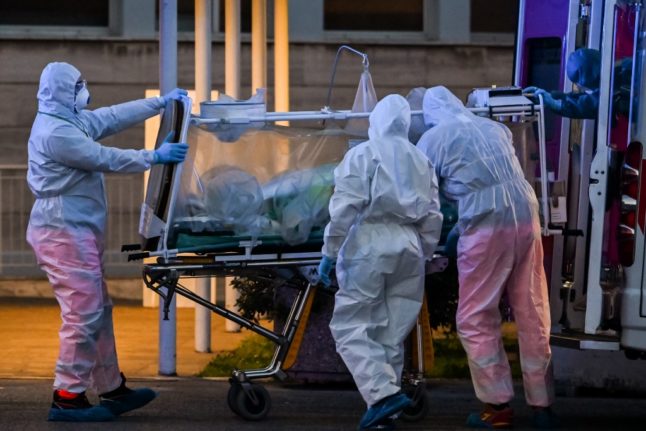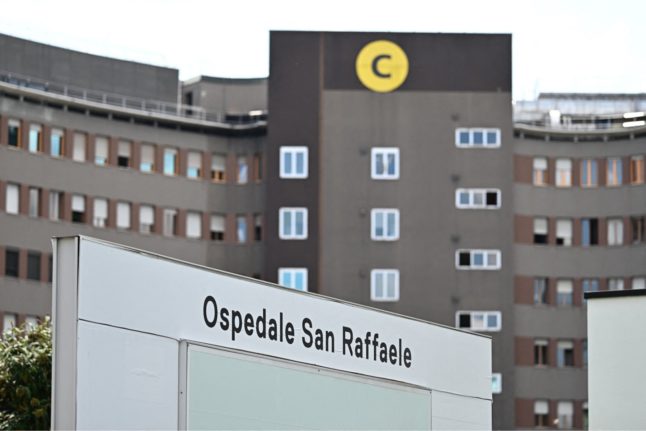Experts predicted earlier this month that the number of new infections recorded during Italy’s coronavirus second wave would peak on Friday November 27th.
In fact, data now shows that the curve started to drop a few days earlier.
READ ALSO: Where to find the latest Covid-19 information for your region of Italy
Trento University physicist Roberto Battiston said on Thursday that Italy’s curve was starting to fall – as he had predicted on November 12th.
According to his calculations, the national Rt number, or transmission rate, is now dropping below 1.
But Battiston warned that “having reached the peak does not mean that we are out of the epidemic, but rather that we are in the most acute phase.”
In an interview with Italian newspaper La Repubblica on Friday, he warned politicians and the public that the apparently improving picture did not mean it was time to “loosen our guard.”
“Even if the overall data indicates the beginning of a descent, there are Italian regions which are still far from the peak,” he said.
Which parts of Italy are seeing the most improvement?
Large regional variations in the coronavirus situation mean that, while Battiston says he is certain that the hard-hit Lombardy and Piedmont regions had already reached the peak of new infections, in Veneto “the number of infected is still growing: the climb should, however, stop in two or three days.”
The number of current infections will peak in Emilia-Romagna by December 8th, he said.
IN GRAPHS: Track the spread of coronavirus in every region of Italy
The number of hospitalizations and intensive care admissions in these areas will peak within a couple of days after the number of infections starts to fall, he explained.
“But then there are regions which still very far from the peak,” he said, naming Abruzzo, Basilicata, Sicily, Sardinia and Puglia.
“The projections tell us that the peak could be reached there at Christmas.”
“In these areas of the country the epidemic is rising again, the Rt goes down too slowly, with frequent oscillations,” he explained. “This is a sign that something is not working.”
The president of Gimbe, Italy’s evidence-based medicine foundation, said that the change would be more gradual this time than during the first wave.
“The effects of the containment measures are also beginning to manifest themselves on the curves of hospitalization and intensive care”, Dr Nino Cartabellotta told Italian news agency Dire.
He pointed out that this “tends to take on the appearance of a plateau, rather than a peak similar to that recorded in the first wave.”
“Therefore it will take much longer to ease the pressure on hospitals than last spring, because the extent of the current containment measures is significantly lower than the total lockdown,”
Would it be safe to relax coronavirus restrictions in December?
The first hopeful signs come as the government this week works on the next set of coronavirus rules, set to come in from December 4th and to cover the Christmas period.
READ ALSO: 'A different kind of Christmas': What will Italy's coronavirus rules be over the holidays?
Though little has yet been officially confirmed by ministers, Italian media is speculating about the possible removal of current restrictions – including shop closures in red zones and the nationwide evening curfew – before or during Christmas.
Battiston slammed the suggestion of relaxing restrictions at this point as “playing with dynamite”.
“It would cause an explosion,” he told Repubblica.
“I repeat that we are at the peak of the second wave,” he said. “It is as if, in the middle of the peak last time at the end of April, when there were 110,000 active infected, we were asked to reopen.”
“In fact things reopened in June, when the number of infected had dropped to a tenth of that. Today, it should be remembered, the number of currently infected is above 800,000.”
The European Center for Disease Prevention and Control (ECDC) has warned EU member of the risks of revoking restrictive measures too early.
According to its most recent predictive models, revoking restrictions around either December 7th or 21st would lead to a rise in hospitalizations, respectively around Christmas or in the first week of January 2021.



 Please whitelist us to continue reading.
Please whitelist us to continue reading.
Thank you!